
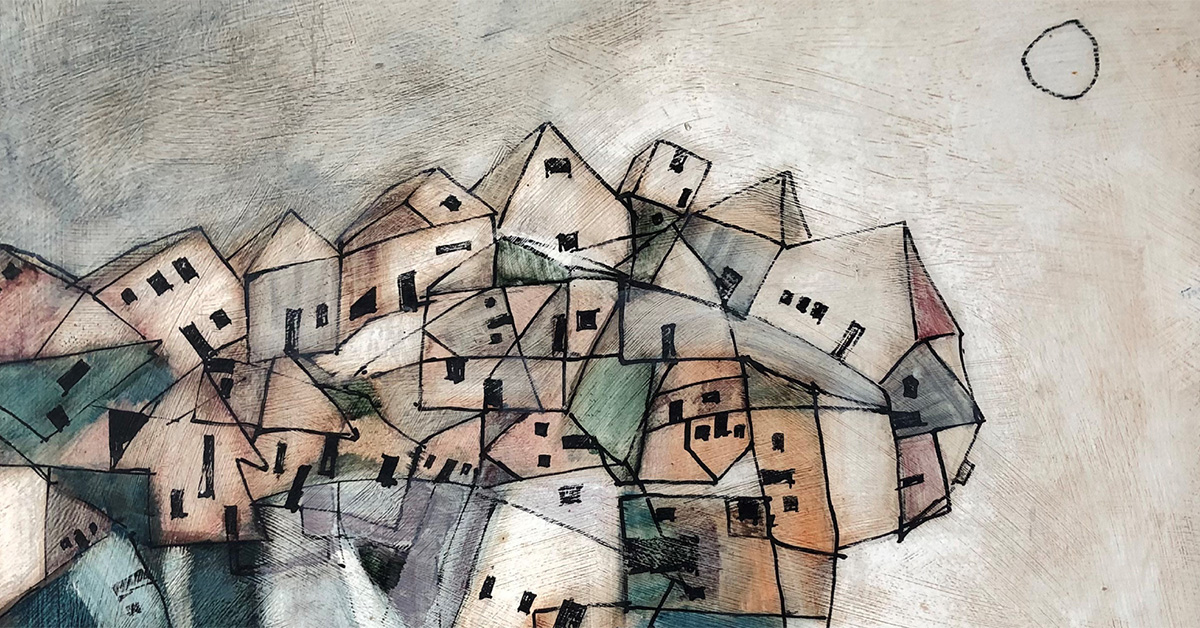
Michael Rhodes is the OT lecturer at Carey Baptist College, Auckland, New Zealand; the author of Just Discipleship: Biblical Justice in an Unjust World (IVP Academic, 2023) and an Associate Fellow of the KLC. Photographs by the author. This essay is dedicated to the Option 105 … for everything.
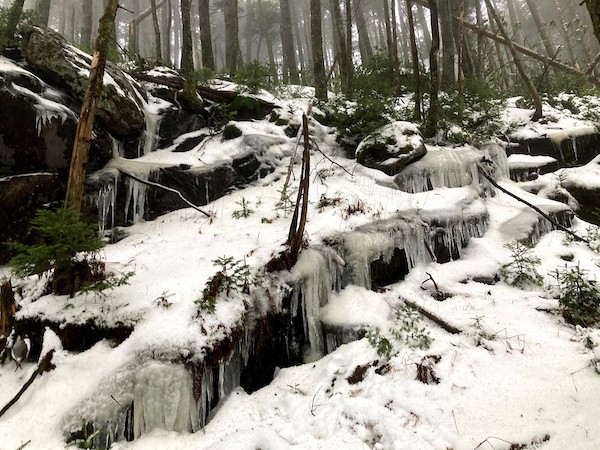
Wolves interrupted my workout today. The pack’s howls penetrated the white noise of whatever theology podcast was happening in my headphones. I heard them, but they did not stop me in my tracks. No, for five or six paces I carried on, tried to ignore them, because, after all, “those can’t be wolves, not real ones, not interrupting my run, not in this city park. No wolves to worry about here.” Even when I realized I was just on the other side of the Memphis Zoo, my first thought was for the recordings that run over the loudspeakers near their exhibit. I’ve been fooled by them before, mind you. No reason to risk missing my lecture.
The last time, the first time, was different.
I was sleeping in a two-man tent pitched in the middle of a vast empty snowfield under a full moon frozen in place by the winter’s frost. My college friend, Christian, was beside me, and we were swapping stories with my cousin Ben who was in the tent beside ours. The wolf pack silenced us, silenced everything, stopped the world for however many seconds they filled the night with their lonely, longing cries.
Nobody spoke.
And then, without any prior planning or communication, we howled back, back into the black, star-saturated sky, back with voices lifted in fear and in longing, back towards that lonely pack lost somewhere along the Canadian border.
When you have as much Alzheimers in your family tree as I do, you tend to meditate on memory, knowing that no experience is so central that you can’t lose it. But I’d wager a flask of whiskey and a couple of fireside cigars on this: when my memories finally fade, the wolf-song under that starlit snowfield will be one of the last to go.
And yet I nearly missed them today, even when they were close enough to cut through my iPhone’s endless noise. In the end, their lingering longing must have resonated with my memory of Montana just enough to cause me to stop, to turn aside, like Moses going to look at this strange sight, to stand on tiptoes and look through the chain-link fence, where six snow-white wolves filled a city block with their soul-shattering sound, to discover that I, too, was standing on holy ground.
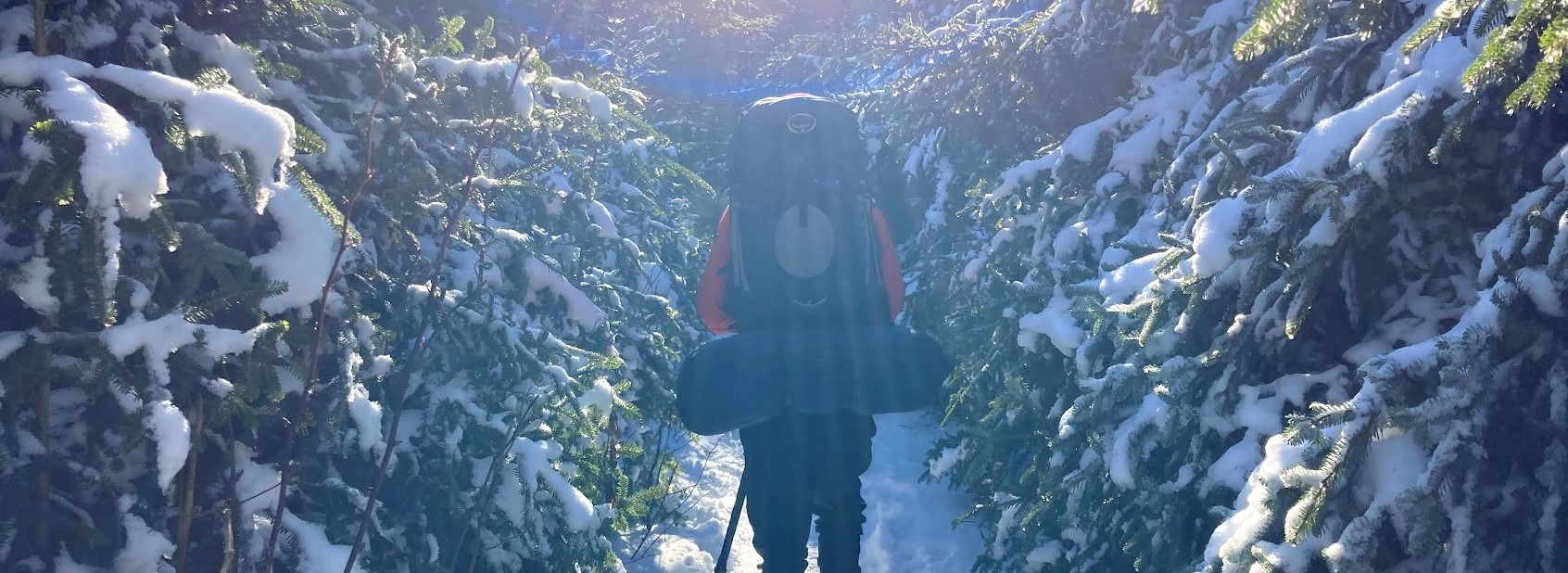
When it comes to hunting for the holy, the pilgrimages help. I stumbled into those early ones. It was simple enough for us college kids to spend a few nights in the woods every New Year, nights we’d have spent out late and irresponsible of others in any case. Now, twenty years later, there are wives who send us off, and children we worry we may be neglecting while we’re away. We fight for these evenings now, fight for the dark nights spent shivering in some three-walled wooden shelter in the Appalachians, waiting for the sun to come up, providing what warmth it will.
When I think of this trip in July, or even on the first cold night of September, my heart shrinks back from it. I’m out of shape, worse than last year. And it was so, so cold. Then one day a searing November sunset seeps through black silhouettes of trees traced against the icy sky. That is when it comes. The world rises up, a priest at evening prayer, declaring: The glory of the Lord shall be revealed, and all flesh shall see it together. That sunset calls me back, back into the wilderness, back into the company of men a year older than we were at last hike, back into the rhythm of boots on hard ground, and God willing, the crunch of snow.
Perhaps this is the point of our pilgrimages. We go to ensure we never lose the wildness that lurks in, with, and under us, a wildness often out of view but constantly present. After all, snakes shed skins in my garden, a bald eagle soared past my son’s kite in a Memphis park, and foxes haunt the suburbs near the house where I grew up. Surely the wild is in this place and we did not know it! Or wouldn’t have, if our brief sojourns in the wilderness hadn’t trained us to claim it when it came.
Our three-day hike makes each outside day holy.
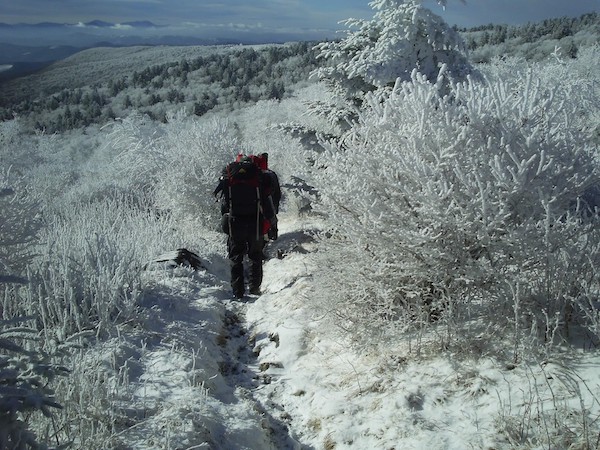
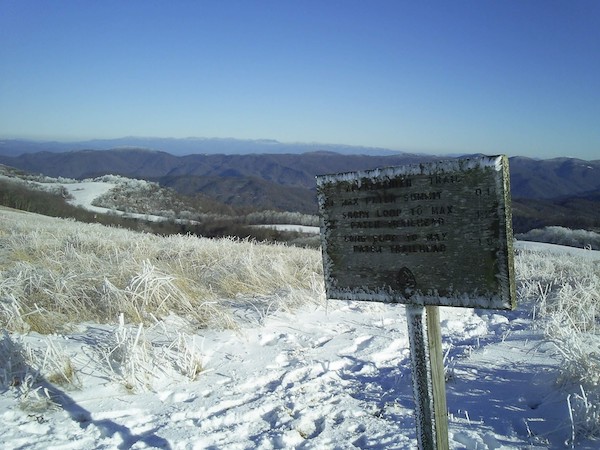
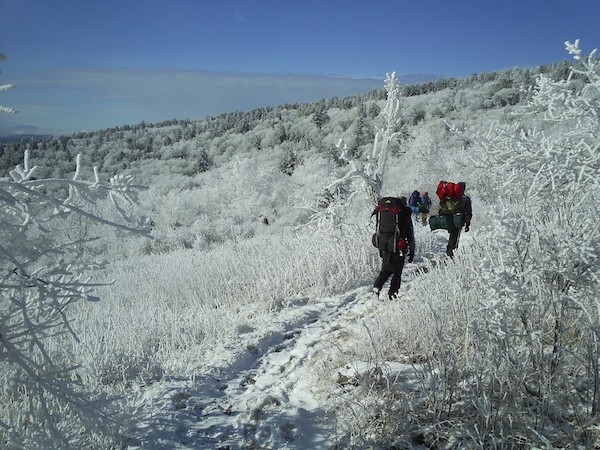
This holy wildness demands a focused attention, a concentration incompatible with the frenetic pace of what we so often call, without any awareness of irony, the “real world.” My personal Zoom room and pocket-sized supercomputer help me churn out data at ever-increasing speeds. I can accomplish any number of tasks, but fail to enter any particular place or moment. At the end of all my work accomplishments, I cannot remember the colour of my office walls, I do not recall any of my 6,435 Facebook friends’ addresses, and I do not know anything about the soil or trees or animal life that still, somehow, share space with the streets that take me to work.
But the wild will not embrace us on these terms. We will slow down or we will find we have not been there at all. To hold the brown trout in your hands you must learn to read the river, to spot the pileated woodpecker it helps to recognize its rapid-fire cuk-cuk-cuk-cuk-cuk-cuk call. And for the last nineteen winters I have grown, subtly and without fanfare, more competent in finding warmth amidst falling mountain temperatures: fill up the empty spaces of your sleeping bag with dry clothes, keep hiking until almost nightfall, don’t layer up too much during the day (nothing is colder when you stop than your sweat), and as soon as you do stop hiking, put on every piece of clothing you’ve got. It’s as if Mother Nature posted an orange warning sign beside each of her doorways: PAY ATTENTION. You can ignore the advice, of course, but there is nearly always a fine.
Like every good pilgrimage, there are moments out there when past and present rush together, the scattered moments of our lives drawn into “the still point of the turning world,” the place where there is only God, and God’s world, and the memories of your most clear-eyed encounters with it all, and the people who were there with you at the time. So we keep going back, back to that pile of Appalachian stone, raised in memorial to remind us that we arrived at mountain streams we did not dig and three-walled shelters we did not build, that Yahweh rescued us from such an array of slaveries we can scarcely attempt to name them and brought us into this land. Not by works, mind. It is the gift of God.
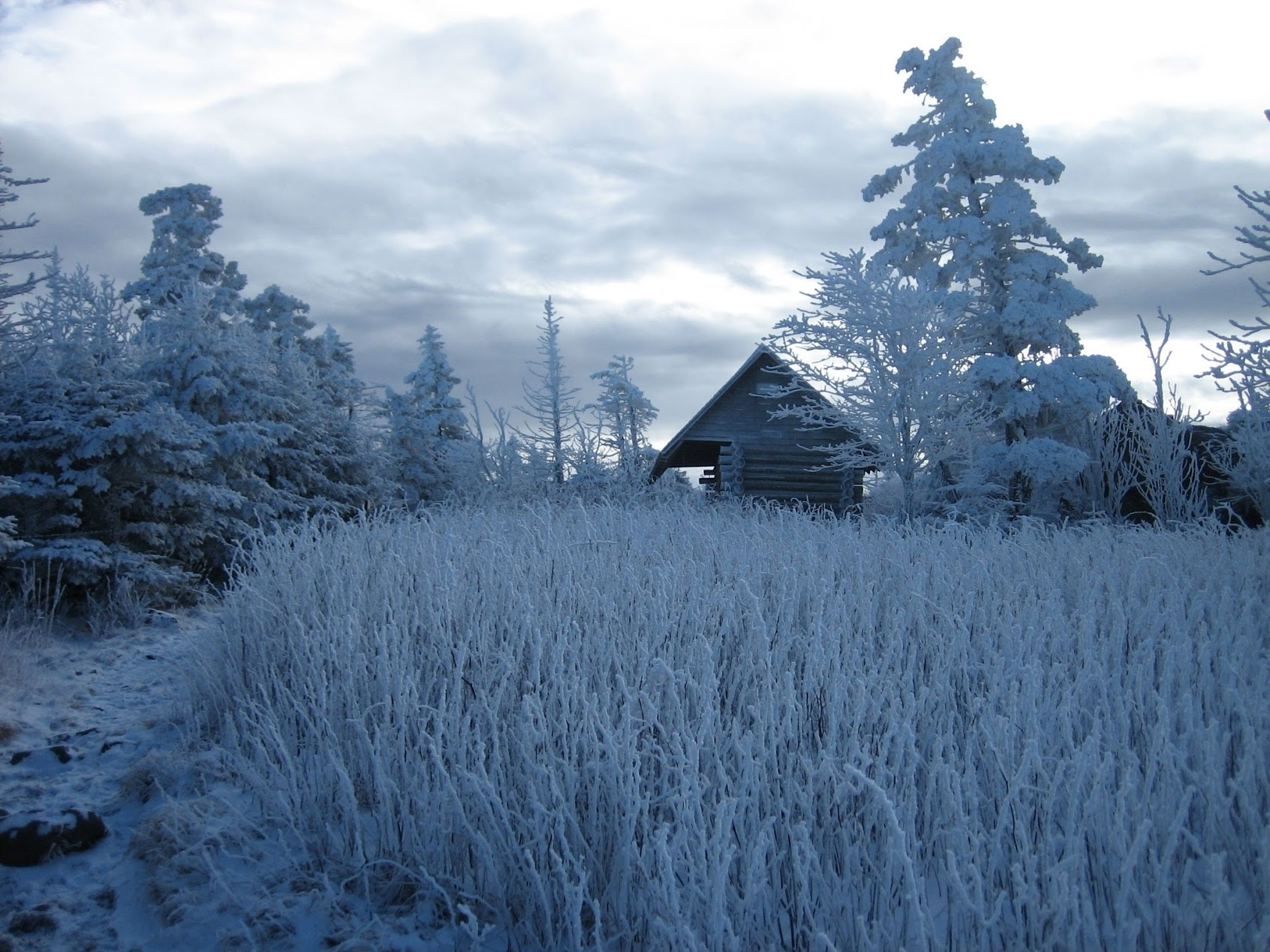
A few years back we woke before dawn because we couldn’t sleep from all the shivering. We crested the first hill as the sun rose on the other side. The light spilled over the edge of the mountain and filled all the ice that clung to every tree in the forest until the whole world was filled to overflowing with it. Annie Dillard saw the “tree with lights in it,” the one the blind girl healed by surgery said she saw the moment she walked into the garden and looked on the world for the first time.
We did not see the tree.
We saw the forest.
A forest on fire, every branch flinging the flames back towards the frozen sky, the trees of the field clapping their hands in the church-bell clanging of branch upon branch, and the mountain filled with the glory of the LORD as the waters cover the seas. We ate cereal bars and drank the last of the whiskey and kept walking to keep the cold out. But on that mountain, we ate and drank beneath the sapphire pavement under the very feet of the Almighty.
Like our ancestors, we were grateful to have survived the encounter.
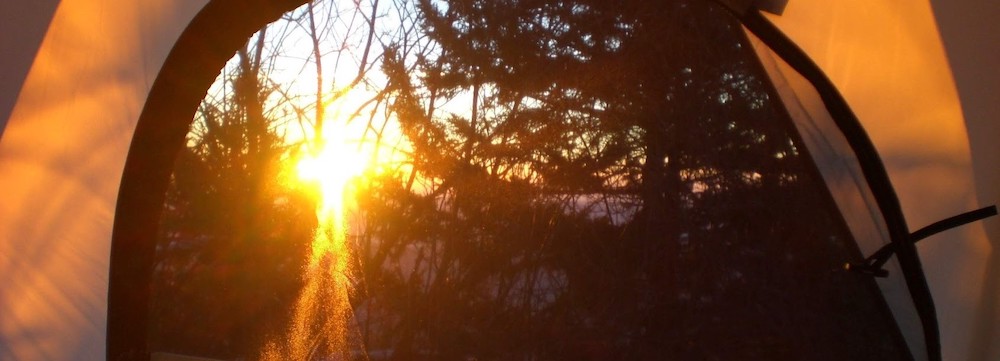
Yet there is pressure on us, despite our pilgrimages. I almost missed the wolves; perhaps Moses almost turned away from the fiery spectacle and stuck with sheep. And what of afterwards? He saw the bush engulfed in divine fire, yet not consumed. But what happened next? In the long, lonely journey back to Egypt, or later, when the people complained nearly every step of the way, did he wonder? Did he consider how much heat stroke could make you see? Did he ponder the potential danger of taking liberation strategies from shrubberies?
Or did every quiet campfire become a sacramental flicker of the flame of the Lord, every smouldering candle a pillar of fire worth following? When he left the dark, smoky holiness of the tabernacle, did the lamp lit in his own tent send him trembling to his knees before the hidden holiness here, there, everywhere?
It’s a wonder Moses ever had the audacity to put his sandals back on.
For all I know, he didn’t. For all I know, he left his shoes at the mountain of God, and danced barefoot across a world hot with divine presence, a world burning, but not consumed. For all I know, Israel’s long trek through the wilderness took even longer because their leader kept leaving the trail, turning aside to see great sights, kept hunting for hidden glory.
I do know this: Israel camped out next to the pillar of cloud by day and fire by night, and still managed to forget to take their sandals off. I very nearly ran past wolves, even when they interrupted my urban exercise. Forget Moses for a moment. Even after our eyebrows have been scorched off, most of us, most of the time, forget the fire.
Which is why, twenty years into this makeshift winter ritual, I’m going back on pilgrimage, back to the wilderness, even if just for a weekend. It’s why the coldest day of the year makes me long for a backpack on my shoulders, the crunch of frost under my feet, and a glimpse of the sun setting fire to the forest as it sets. It’s why, shivering in a sleeping bag on a winter night in the Smoky Mountains more than a century after they were hunted to extinction there, I’ll lie awake, listening for the wolves.
